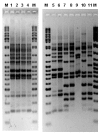Legionnaires' disease outbreak in Murcia, Spain
- PMID: 12967487
- PMCID: PMC3020623
- DOI: 10.3201/eid0908.030337
Legionnaires' disease outbreak in Murcia, Spain
Abstract
An explosive outbreak of Legionnaires' disease occurred in Murcia, Spain, in July 2001. More than 800 suspected cases were reported; 449 these cases were confirmed, which made this the world's largest outbreak of the disease reported to date. Dates of onset for confirmed cases ranged from June 26 to July 19, with a case-fatality rate of 1%. The epidemic curve and geographic pattern from the 600 competed epidemiologic questionnaires indicated an outdoor point-source exposure in the northern part of the city. A case-control study matching 85 patients living outside the city of Murcia with two controls each was undertaken to identify to outbreak source; the epidemiologic investigation implicated the cooling towers at a city hospital. An environmental isolate from these towers with an identical molecular pattern as the clinical isolates was subsequently identified and supported that epidemiologic conclusion.
Figures




References
-
- Breiman RF. Impact of technology on the emergence of infectious diseases. Epidemiol Rev. 1996;18:4–9. - PubMed
-
- Ishimatsu S, Hiroshi M, Hori H, Tanaka Y, Yoshida SI. Sampling and detection of Legionella pneumophila aerosols generated from an industrial cooling tower. Ann Occup Hyg. 2001;45:421–7. - PubMed
MeSH terms
LinkOut - more resources
Full Text Sources
Medical
